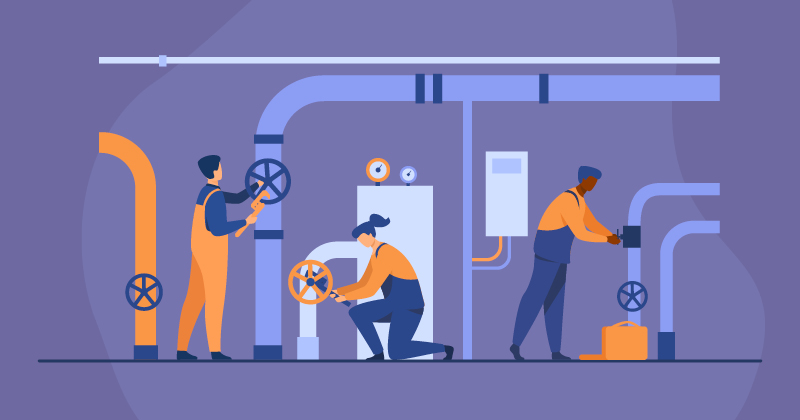Alarm bells are sounding across the UK skills landscape, with major industries such as technology and life sciences facing daunting shortages of talent according to projections.
However, with a changing regulatory landscape and ambitious targets to ‘Get Britain Building’, construction is being hit particularly hard.
Some would say that right now we are living through the perfect storm. Apprenticeships are notoriously difficult to come by, we’ve suffered a long-term lack of training investment, the pandemic caused early retirements when apprenticeship opportunities were being reduced, Brexit meant we lost workers, and our workforce is ageing.
As a result, there’s a huge skills gap right across the construction industry – hampering the government’s mission to build fast for economic growth.
The skills gap becomes more foreboding by the day
Around 73,700 new plumbers are needed in the UK by 2032, with current construction apprenticeship drop-out rates standing at a staggering 47 per cent according to a report from the British Association of Construction Heads.
The skills gap is becoming more foreboding by the day.
Ultimately, the main solution is education and a major first step has just been taken with the Institute for Apprenticeships and Technical Education (IfATE) formally approving CIPHE’s proposal to develop new level two and level three plumbing apprenticeship standards.
These standards follow immense consultation and collaboration across
the industry. To develop them, the CIPHE engaged extensively with plumbing industry affiliated bodies including colleges, independent training centres,
manufacturers, merchants, industry representative organisations and government departments.
The CIPHE has also formed and consulted a plumbing employers’ trailblazer group made up of sole traders, employers, awarding organisations and end-point assessment organisations to ensure these new standards are reflective of on-site realities. This ongoing consultation will assist the group to determine the core skills modules required.
Now, with official approval, the industry is making a step in the right direction to ensure college courses will be more accessible, apprenticeship opportunities begin to increase, and, in time, we will see more people embarking on plumbing and heating careers.
More career entry points
Our education survey in 2023-24 showed 90 per cent of respondents, including industry employers, colleges and those in learning, supported the proposal to introduce plumbing apprenticeships at levels two and three.
A two-pronged apprenticeship addresses the key concerns of both attracting and retaining talent in the industry by increasing accessibility to a wider pool of potential candidates, and providing additional career entry points for those looking to join the industry.
The level two standard allows apprentices to complete an end-point assessment covering topics such as hot and cold-water installations, sanitation and rainwater systems. Successful completion provides learners with a range of options for level three progression.
The qualifications protect high standards of work whilst simultaneously providing more opportunities for plumbing apprentices – especially those who aspire to achieve professional recognition as an engineering technician or even a chartered engineer.
Crucially, these qualifications not only provide the platform to develop talent, but also function as an incentive for employers to take on an apprentice. Through this route businesses can support apprentices through level two without having to worry about providing on-the-job experience in areas outside of their usual remit or having to immediately commit to a full four-year period of training.
Reinforcements are coming
The CIPHE’s new career pathway has only been made possible by working closely with industry employers and educational bodies to understand [ITALS] exactly where the problems and opportunities lie. Their insights, opinions and discourse have been instrumental in shaping this new educational strategy.
The crisis in plumbing education is not going away anytime soon. Whilst the aim is to get this new apprenticeship up and running as soon as possible, the work with plumbing employers and relevant stakeholders to ensure apprenticeship standards will be fit for purpose only ramps up from here. This is an essential moment of progress, but it really is just the beginning.
As this collaboration continues with the stamina and enthusiasm the industry has shown in recent months, in just a few years, the first of those 70,000 missing plumbers will emerge on the horizon.

















Your thoughts